April 15, 2025 | 11:00 GMT +7
April 15, 2025 | 11:00 GMT +7
Hotline: 0913.378.918
April 15, 2025 | 11:00 GMT +7
Hotline: 0913.378.918
In 2016, the Kon Tum Provincial Party Committee issued a resolution to develop high-tech agriculture linked with deep processing. Since then, the province's agricultural production has made a shift towards modernization, with high-tech applications being more widely developed.
According to a report from the Kon Tum Provincial People's Committee, the province has recognized two high-tech agricultural zones: the coffee production area (Dak Ha District) and the vegetable, tuber, and fruit production area in Mang Den (Kon Plong District). In addition, seven businesses have been recognized for high-tech agricultural production, and the province has also identified 10 areas with potential to form concentrated high-tech agricultural production zones.
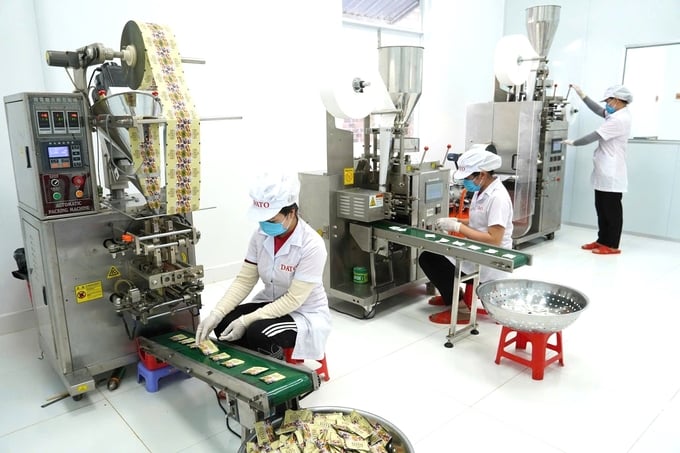
The application of high technology linked with deep processing is being strongly promoted by Kon Tum Province to attract investment. Photo: Tuan Anh.
In addition, Kon Tum has reported over 27.200 hectares of agricultural land utilizing scientific and technological advancements, with more than 2.500 hectares of this land certified according to quality standards.
One of the most notable developments is the increasing attraction of businesses to the province, which are investing in a variety of high-tech agricultural products. Specifically, over the past three years, Kon Tum has successfully attracted 20 high-tech agricultural investment projects with a total capital of more than 149 million USD. Moreover, the province has established 13 new factories, bringing the total number of high-tech agricultural deep-processing factories in the region to 37 factories.
An example of such success is Tay Nguyen Herbal Co., Ltd. (Dak To District), which has been recognized as a high-tech agricultural enterprise. The company is currently collaborating with the Xo Dang ethnic group to grow medicinal plants and spices in Kon Tum. Tay Nguyen Herbal Co., Ltd. operates three factories, covering thousands of square meters, where they process and manufacture products from herbs and spices. These products meet international quality standards, including ISO 22000:2018 and FDA certifications. Thanks to their high-tech production methods, the company’s products are able to meet the strict export requirements of demanding markets such as the United States, South Korea, China, and several other countries.
Explaining the reasons behind their investment in the development of high-tech agriculture, Ms. Luong Thi My Hue, Director of Tay Nguyen Herbal Co., Ltd., shared that the Kon Tum region has excellent potential for growing medicinal plants and spices. However, for a long time, these crops have primarily been produced in raw form, which has resulted in relatively low economic value. The full potential of these medicinal plants has not been realized, as their quality and value could be significantly enhanced if produced using modern, high-tech agricultural methods.
"The company aims to develop and transform the region's unique agricultural products into high-quality, deep-processed goods, ensuring that they meet the growing demand in both domestic and international markets. To achieve this, the company will make substantial investments in state-of-the-art machinery, production lines and the application of technology in the raw material areas", Ms. Hue shared.
In a similar vein, Ta Tien Single Member Co., Ltd. (Dak Ha District) has been recognized for its application of high-tech practices in the aquaculture sector. The company is currently focused on advancing technology in freshwater fish farming to achieve high yields and superior product quality.
Mr. Nguyen Huu Ta, Director of Ta Tien Single Member Co., Ltd., explained that to obtain high-tech certification, the company had invested heavily in machinery, equipment, and the integration of scientific technology into its production processes. He highlighted that the application of technology in the care and breeding of fish is crucial for ensuring the quality and increasing the productivity of the farmed products. "To successfully develop the fish breeding industry, it is not only important to have the proper machinery, but also to construct standardized tanks and carefully select fish species with verified origins to ensure effective breeding", said Mr. Ta.
Mr. Ta also pointed out that the application of high-tech solutions in production has resulted in the widespread acceptance of the company's freshwater aquaculture products in both local and regional markets. Currently, the company provides more than 600 tons of fish seed and marketable fish products to the market each month.
After nearly 10 years of implementing the resolution to develop high-tech agriculture linked with deep processing, the agricultural sector in Kon Tum has undergone significant changes. As a result, high-tech agriculture has attracted many businesses, cooperatives, and local people to participate, contributing to the promotion of the province's socio-economic development.
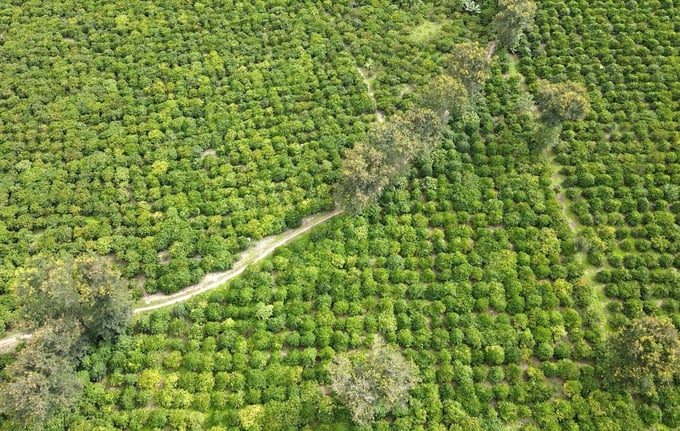
A high-quality coffee growing area in Dak Ha District. Photo: Tuan Anh.
Notably, the two high-tech agricultural zones in Dak Ha and Kon Plong districts are representing a new mindset for modern agriculture. A standout example is the high-tech agricultural zone in Kon Plong, which spans approximately 170 hectares and is home to numerous vegetable, tuber, and fruit gardens. These crops are being cultivated using advanced agricultural techniques, with a focus on sustainability. The gardens exclusively rely on organic fertilizers and biological products.
In contrast, in Dak Ha District, the high-tech coffee production zone is rapidly expanding, with nearly 2.000 hectares of land involved, encompassing businesses, cooperatives, and local farmers who are actively investing. Here, coffee is cultivated following rigorous standards such as VietGAP and 4C, using bio-based products and organic fertilizers.
Mr. Nguyen Tri Sau, Director of Sau Nhung Agriculture - Production and Trade Cooperative, explained that the cooperative's members have been involved in the high-tech coffee production zone for almost 200 hectares. In this region, coffee cultivation benefits from water-saving irrigation systems, as well as the introduction of modern machinery, which significantly reduces the manual labor required from local workers.
"Since we joined the high-tech coffee zone, the investment costs for our cooperative members have significantly decreased, especially since we no longer need as much labor as we did with traditional farming methods. At the same time, the quality of the coffee has greatly improved because the crops are properly cared for with the help of technology and machinery", Mr. Sau shared.
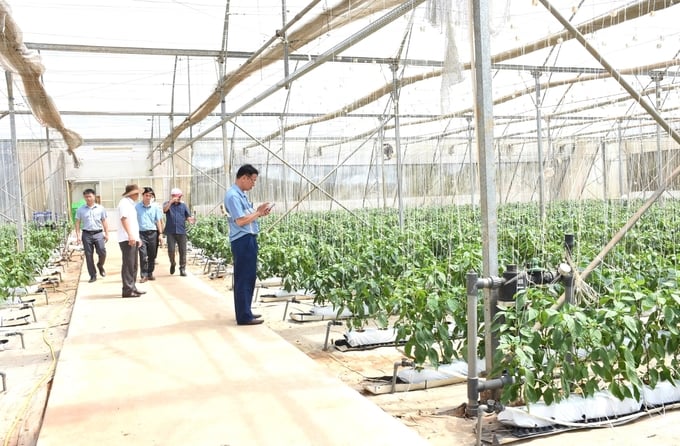
High-tech agriculture in greenhouse cultivation in Kon Plong District. Photo: Tuan Anh.
In his conclusion on the implementation of the high-tech agriculture development project, Mr. Nguyen Duc Tuy, Deputy Secretary of the Kon Tum Provincial Party Committee, emphasized that for the agricultural sector to effectively integrate high-tech practices in conjunction with the processing industry, it is essential to attract significant investment into both the production and processing of agricultural products. He highlighted the importance of developing supportive policies that promote organic farming and the application of high-tech methods in agriculture.
A key focus, according to Mr. Tuy, should be the establishment of policies that encourage investment in technology and machinery for agricultural production, which would not only improve productivity but also enhance the quality of agricultural products. Additionally, the creation of concentrated raw material production zones across the province is vital for boosting efficiency and sustainability in agricultural practices.
Furthermore, Mr. Tuy emphasized the need to implement the "6-house" linkage model, which includes collaboration between the "State - Farmers - Scientists - Businesses - Banks - Distributors".
Mr. Nguyen Duc Tuy, Deputy Secretary of the Kon Tum Provincial Party Committee, shared that the region is currently facing a shortage of leading "pioneer" companies that can take the lead in guiding local farmers to adopt high-tech solutions in agricultural production. As a result, he emphasized that in the near future, it is crucial to focus on intensifying efforts to promote and attract large businesses to invest in the development of high-tech agricultural zones. These investments should be closely tied to the establishment of factories and deep-processing facilities.
Translated by Phuong Linh
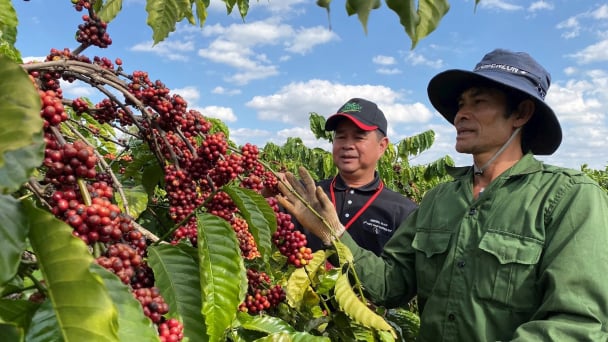
(VAN) Businesses emphasize fairness and equality when integrating social factors into their sustainable development strategies.
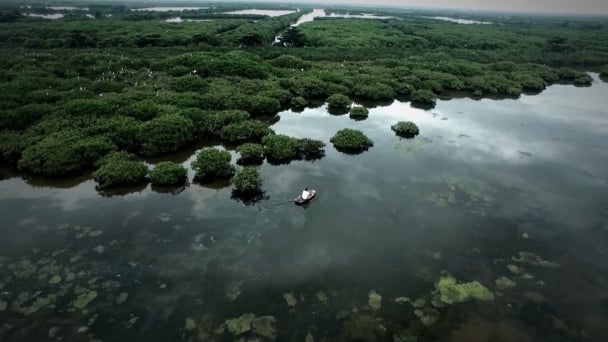
(VAN) French organizations and enterprises propose that Thai Binh province provide potential and long-term cooperation contents related to climate change response and green industrial development.
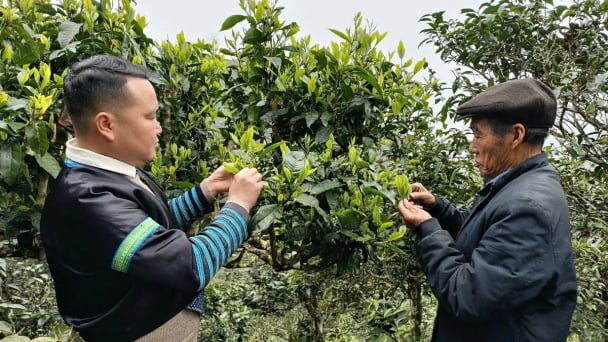
(VAN) Shan Tuyet tea is considered a 'heavenly treasure'. The H'mong people allow the tea to grow naturally, adhering to organic production principles, with the aim of exporting the product.
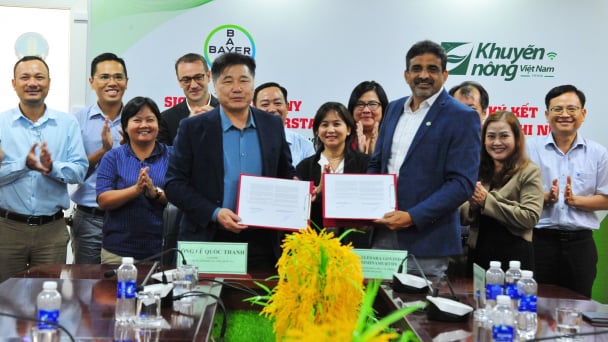
(VAN) Bayer Vietnam and the National Agricultural Extension Center have signed a partnership agreement to expand the development of effective and safe farming models for rice, durian, and coffee.
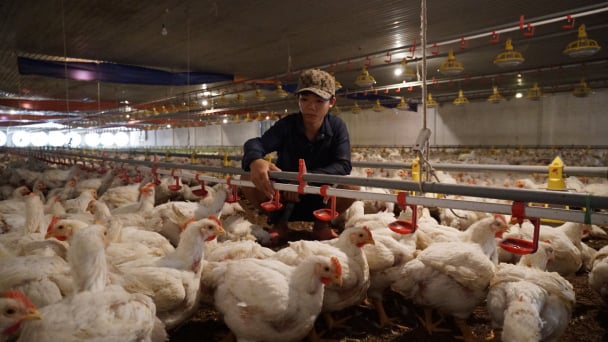
(VAN) Tay Ninh province possesses all the favorable conditions, from natural advantages to geographic location and social harmony, to drive economic development, particularly in attracting investment and advancing modern livestock farming.
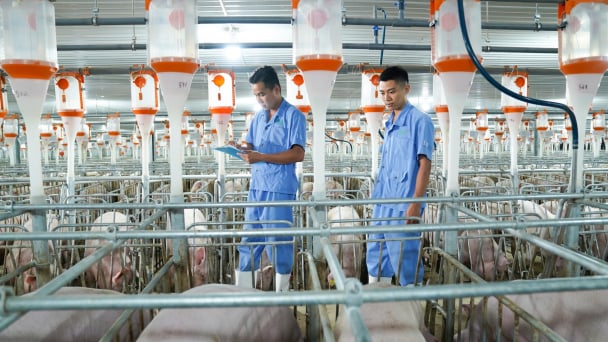
(VAN) Notably, every link in BAF's entire closed livestock value chain Feed - Farm - Food has received international certification.
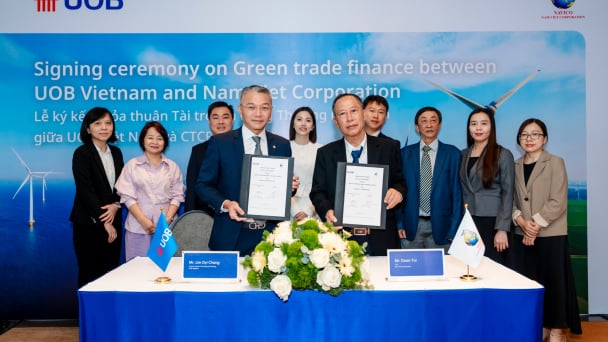
(VAN) UOB Vietnam has recently signed a green credit agreement with NAVICO to develop sustainable aquaculture that meets international standards.